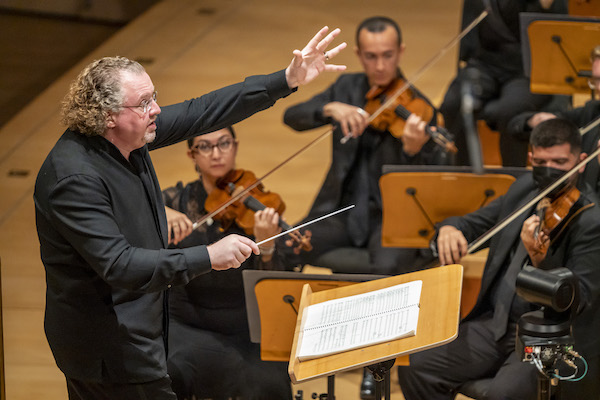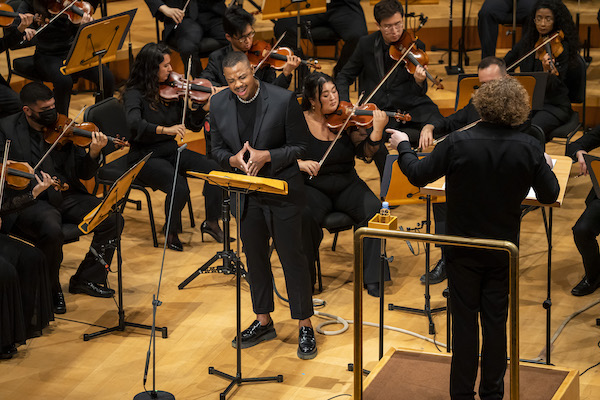Denève takes the New World reins with a thrilling and diverse debut

Stéphane Denève conducted his first concert as artistic director of the New World Symphony Saturday night. Photo: Alex Markow
The Stéphane Denève era at the New World Symphony has begun.
The French conductor made his official debut as the orchestral academy’s artistic director on Saturday night at the New World Center and the music-making was exceptional. Previous Denève New World appearances have produced exceptional concerts and the ensemble’s new leader did not disappoint on this historic occasion. (Denève is only the second conductor to occupy the position in the organization’s 35-year history.)
Richard Strauss’s tone poem Ein Heldenleben (A Hero’s Life) was the concert’s featured work. A more egotistical composition has probably never been written in the entire history of the classical canon. In this score, Strauss paints the hero (himself) as a valiant soldier who does battle with his enemies (music critics) and ultimately triumphs to domestic bliss and creative profundity. Strauss bathes this self portrait in lustrous instrumental textures, gorgeous melodic strands and structural mastery. The work has long become a classic that transcends the questionable taste of its self-aggrandizement.
Conducting an enlarged orchestra that included 2 harps, 9 horns, 4 trombones and 5 trumpets, Denève led a cogent, well considered reading that was alive and vibrant. Denève’s conception allowed for spontaneity, flexibility and in-the-moment excitement without micro-managing details.
The opening iteration of the hero’s theme was shaped broadly and the winds’ scampering figurations (portraying music critics) were taken at a brisk clip with light instrumental articulation. The solo violin represents the hero’s wife. Playing a 1753 Guadagnini instrument, first-year fellow Beatrice Hsieh’s soaring tone and precision, whether waxing lyrical or accenting rapid-fire bravura delivered playing of the highest order. In the love scene, the richness and depth of corporate string sonority reached a level rarely heard in previous New World performances.
Three offstage trumpets announced the call to war, and Denève infused spring in the step of “The Hero at Battle.” bringing vigor and robust acceleration to a sequence that can easily turn vulgar in less pristine performances. The triumphant return of the hero’s motif engulfed the hall in the warmth of massive strings and brass.
A plaintive, elegantly phrased English horn solo marked the transition to “The Hero’s Retirement from the World.” Hsieh’s final violin solo and the elongated phrasing of the farewell theme by the strings in glowing tonal hues capped a fluent, idiomatic traversal.
Throughout the score’s 46-minute duration, Denève’s command of instrumental cohesion was total. The ovation that followed was long and loud with the conductor showing great generosity in repeatedly having individual players and full sections rise to accept special plaudits.
The concert’s centerpiece spotlighted baritone Davóne Tines’ “Concerto No. 1 SERMON.” Dressed in the black garb of a minister, Tines combined readings of texts by James Baldwin, Langston Hughes and Jessica Care moore with vocal works by John Adams, Anthony Davis and Igee Dieudonné and Tines. The spoken text and musical selections proved well matched and exceedingly effective. A brief excerpt from Baldwin’s “A Letter to My Nephew” was matched with “Shake the Heavens” from Adams’ nativity oratorio El Niño. This music is quintessential Adams, brassy repetitive minimalist fragments surrounding words familiar from Handel’s Messiah. Tines’ molten baritone, superb declamation and clear diction emblazoned Adams’ very different, tersely dramatic setting.
The meditation on loneliness of Hughes’ “Hope” preceded the Dieudonné-Tines VIGIL. Throbbing, pensive string lines surrounded Tines’ soft mellow vocalism to haunting effect. (Rising composer Matthew Aucoin contributed the luminous arrangement.)
Care moore’s EXEGESES. both an angry cry against injustice and a plea for understanding, was prelude to “Malcolm’s Prison Aria” from Davis’ The Life and Times of Malcolm X (a revival of which is scheduled to be produced at the Metropolitan Opera next season). After weird harmonic progressions from the winds and jazz infused introductory strains by piano and trumpet, the tumult of Davis’ orchestral writing seems divorced from the noble vocal path of Malcolm’s bitter monologue.
Despite the less than felicitous musical conception, the sheer intensity of Tines’ stentorian delivery produced a memorable coda to his innovative compendium of music and dramatic social commentary. Denéve’s beautifully calibrated orchestral backdrop displayed his affinity for the diverse idioms of American music. Tines is clearly a fine singer and commanding stage presence, and one looks forward to hearing more from this versatile artist.
Obviously eager to emphasize his Gallic roots, Denève opened the evening with Mètaboles by Henri Dutilleux (1916-2013). Dutilleux was one of contemporary music’s true originals who refused to blindly follow any dogma or ideological stylistic path. Over a seven- decade career, he produced only a small number of meticulously sculpted works. Mètaboles (completed in 1964 for the 40th anniversary of the Cleveland Orchestra) is a concerto for orchestra in everything but name. Each of the orchestra’s sections take center stage in the course of the score’s five movements.
Abrupt chords open “Incantatory” as small thematic units from clarinet and mallet percussion organically evolve into larger structures. Somber strings embody “Linear.” Denève drew silken textures from the string players, a woody and burnished solo cello particularly distinguished, Plucked bass and spooky figures in horns and winds introduce the bright, shiny brass fanfares of “Obsessive.”
The 7 percussionists had a field day with the coloristic writing of “Torpid.” After restrained taps and beats, the full battery is turned loose, followed by a brass chorale. Rapid fragments whirl through the ensemble in the climactic “Flamboyant” segment. Julianna Darby’s winding clarinet solo roulades took special honors in a brilliant orchestral performance. Denève brought out instrumental textures with transparency and his mastery of this complex creation aptly signified his command of wide-ranging repertoire.
The clear sense of engagement and rapport between conductor and orchestra permeated the entire concert. Clearly the New World Symphony has opened an exciting new era and artistic journey under Denève’s leadership.
Peter Oundjian conducts the New World Symphony in Joan Tower’s Duets, Elgar’s Enigma Variations and Joel Thompson’s To Awaken the Sleeper with the composer as narrator. Chad Goodman conducts the Overture to Mozart’s The Magic Flute. 7:30 p.m. Friday and 8 p.m. Saturday at the New World Center in Miami Beach. nws.edu
Posted in Performances
Leave a Comment
Sun Apr 9, 2023
at 2:00 pm
No Comments
